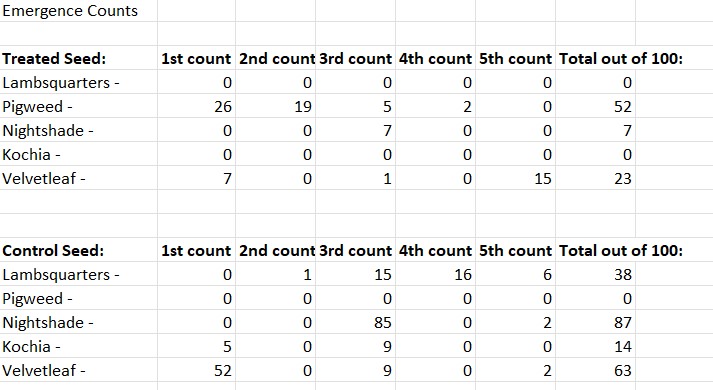Aiming to restore balance in the environment Contact Organics’ products controlling focus on unwanted plant growth while improving soil microbiology.
According to the USDA Forest Service, there are an estimated 2,000 invasive and noxious weed species are already established in the United States.
In a previous blog post, we focused on Tropical soda apple (TSA) treatment using the Weed Terminators. After witnessing the powerful effects of our nontoxic herbicide products on TSA seeds in Georgia, Contact Organics conducted a quick trial on a variety of weed species on a farm in Iowa last summer.
The weeds were sprayed when the seed was close to full maturity on the mature weeds. While we did not do a side by side trial which would have been preferred, we were able to show we could have similar results to the TSA. We will be proceeding with a formal weed control trial.

Kochia and Lambsquarter had zero germination.
Kochia (Bassia scoparia) is an annual herbaceous plant that has a deep taproot and grows 1.6 to 4.9 feet tall. Kochia stems are upright and spreading with many branches. Kochia flowers are small and green, grouped in clusters in the upper leaf axils and on terminal spikes (Washington State Noxious Weed Control Board).
Common Lambsquarters (Chenopodium album L.) is a summer annual weed that emerges in the spring sets seed in late summer/fall and dies. The common lambsquarters is and early emerger producing between 30,000 to 176,000 seeds/plant. The average seed production is 72,500 seeds/plant. The common lambsquarters can last up to 12 years with 50% of seeds are depleted, up to 78 years when 99% are depleted. One study found 32% viability after 20 years. As the soil depth increases, the seed dormancy increases. Some conditions can break dormancy such as high levels of soil nitrate, exposure to light and fluctuating temperatures. Seeds on a single plant have different dormancy requirements. This is one reason why lambsquarters seeds is so persistent in the soil. Common lambsquarters is a competitive weed. It is know to have caused 13% yield loss in corn with one lambquarters plant per 1.5 foot of row; 25% yield loss in soybeans with less than one plant per foot of row; 48% yield loss in sugar beet from one plant per foot of row.
The Weed Terminators performance is undisputable! We headed in the right direction.

 Australia
Australia New Zealand
New Zealand 日本語
日本語
0 comments
Be the first to comment below...